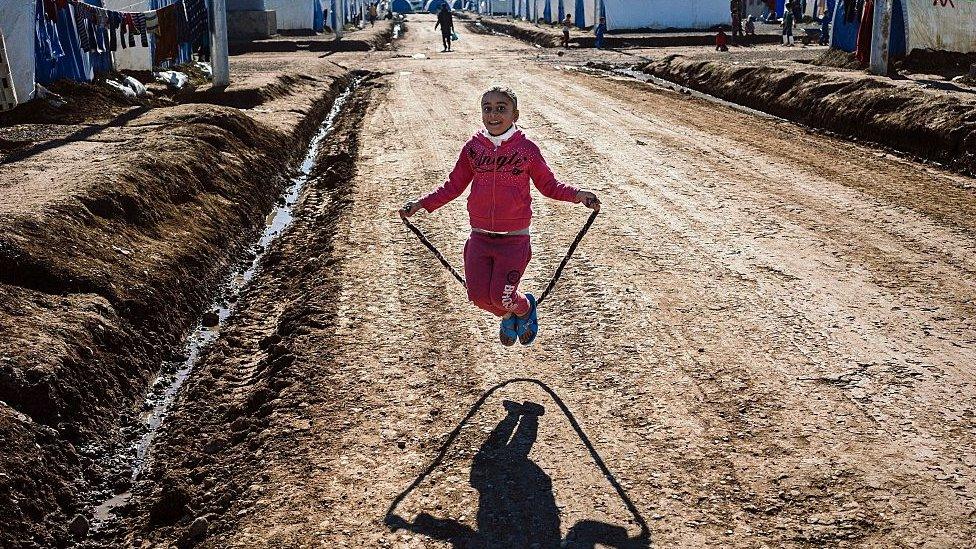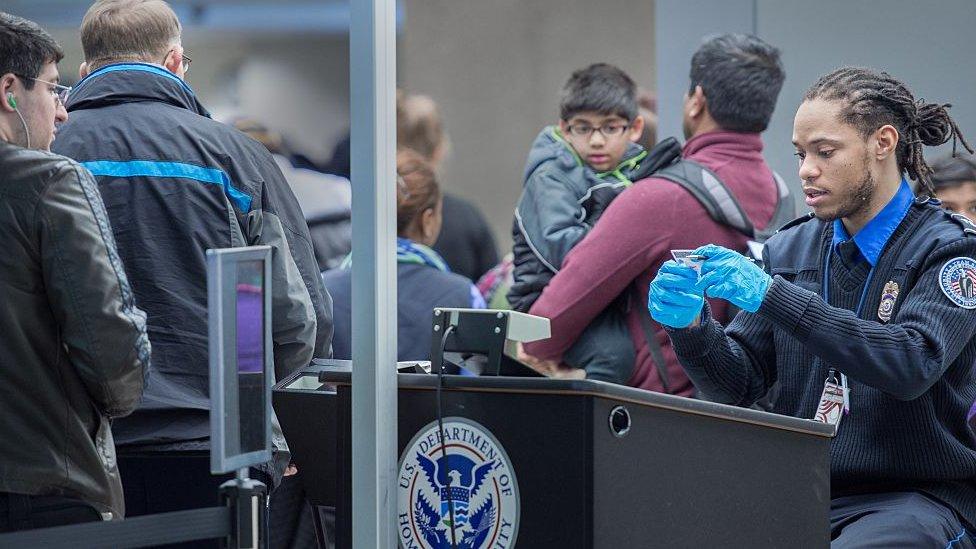Trump's 'extreme vetting' order sows seeds of panic
- Published
Which countries might be subject to Trump ban?
Donald Trump's executive order on immigration to the US from countries in the war-torn Middle East is causing panic among refugees.
Tom Jensen, an immigration lawyer in Washington DC, spent a good portion of his day Wednesday on the phone to a frantic client in Iraq.
Jensen was trying to show the man - an Iraqi national who sold supplies to the US military for many years during their time in Baghdad - how to buy a plane ticket online. The man has never flown before.
The man - whom Jensen does not want to name - and his family earned admittance to the US under the Special Immigrant Visa programme, reserved for Iraqi and Afghan nationals who worked for the US military during the conflicts there, often as translators and interpreters. Jensen's client had been threatened repeatedly, first by insurgents and then by the so-called Islamic State, and Jensen briefly lost touch with the family after they fled.
In December 2016, after a three-year process, the man and his family were finally approved for resettlement in the US. They are scheduled to board a plane for the US on 7 February.
But on Wednesday, after a draft copy of President Donald Trump's executive action on refugees and immigration from predominantly Muslim countries was leaked to the press, panic erupted around the globe among refugees, their families and advocates.
Jensen's client considered spending considerable money to buy next-day tickets for himself, his wife and his three children in an effort to outrun President Trump's pen.

No such order was signed on Wednesday or Thursday, and Jensen's client ultimately decided to wait.
"[I'm] feeling frustrated and a little embarrassed, actually, that our government would jerk people around like this," says Jensen. "A guy who risked his life to help the US military during the war - I feel like we owe him."
President Trump finally signed the executive order late Friday afternoon.
It differs slightly from the draft version, though the basic tenets remain the same. The order, titled "Protecting the Nation From Terrorist Attacks by Foreign Nationals", has many immigration lawyers scrambling to figure out what will come next.
The most dramatic provisions listed in the draft version suspend all refugee admissions for four months, indefinitely bar entry for Syrian refugees, and suspend all visa entry into the US from several countries for 90 days. Those countries have predominantly Muslim populations, and are reported to be Syria, Iran, Iraq, Somalia, Libya, Sudan and Yemen.
Becca Heller, director of the International Refugee Assistance Project, external, spent her Wednesday answering a flurry of emails and phone calls from all over the country.

"Everyone is panicked. No one knows what this means," says Heller. "We have clients whose lives are seriously at risk, who are days away - approved, given visas and simply awaiting travel dates.
"Many of these people are at risk because of their ties to America - either because they have family here or because they worked with American forces."
Sari Long is another immigration lawyer who has been working for months to reunite an Iraqi family - the father entered the US in 2012 under a Special Immigrant Visa for his years of work as an interpreter for both Army soldiers and Marines, and later for American civilian contractors. He has been trying to bring over his wife and sons for years.
Long says she doesn't know if the family would fall under the 90-day ban on visa entry from Iraq, or if they will be classified as "refugees" instead of "immigrants", and have to wait 120 days.
There is also confusion as to what will happen to immigrants and refugees who are already on flights to the US.
Will they be immediately returned to their countries of origin, or given a kind of amnesty?
"They have tickets to fly - we don't know what to tell them," says Long. "We have no information."
Fight to stop refugees from settling in the American West
Despite the frenzied rumours of what may be to come, Kay Bellor, vice-president of programmes for Lutheran Immigrant Refugee Services, a refugee resettlement agency, says that all of their clients who were booked to enter the country this week have arrived without incident.
She is hoping that her agency will eventually return to business as usual after the Trump administration has a chance to review the vetting processes.
"I was actually working in the US refugee programme on 9/11 and that was just horrific ... and we got through it," says Bellor.
"I think we will get through this. What we've seen of an executive order does not do away with the US refugee programme or the American commitment to refugees. I'm a 'glass half full' kind of person."
However, she, like other refugee advocates, frets that closing the country to refugees and especially to former allies who assisted in US conflicts is actually a threat to national security.
"I think it's really going to hurt our standing in the world," says Heller. "Whatever our next foreign policy adventure is, we're going to need local buy-in. If we abandon our allies on this, we're going to have trouble finding new allies."